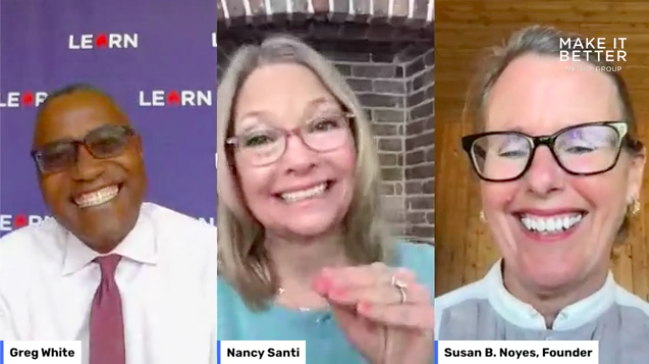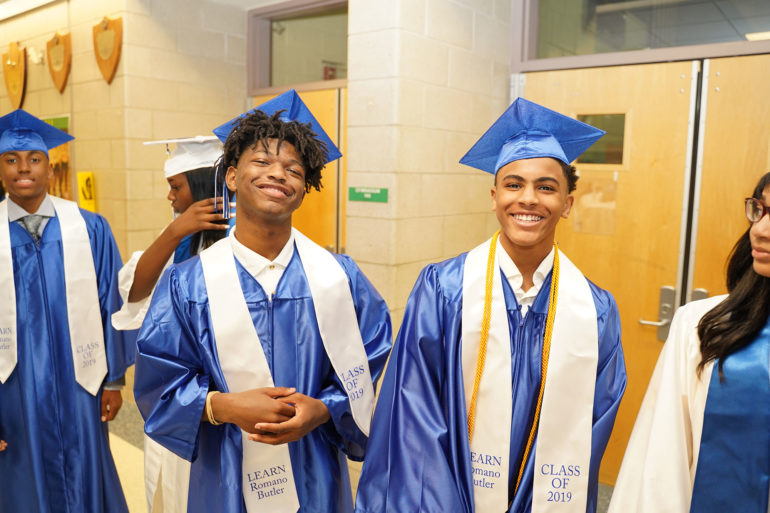At the forefront of our future is the next generation. In order to prepare them for that future, steps need to be taken now to ensure that their educational and social development is on par. This very notion is the reason institutions like LEARN Charter School Network exist — so says the panel at the June 22 Founder’s Fireside Chat, hosted by Make It Better Media Group.
Speaking from hands-on experience, on the panel was Greg White, President and CEO of LEARN Charter School Network; Nancy Santi, Anniversary Fund Co-chair of LEARN Charter School Network; and moderated by Susan B. Noyes, Founder and Chief Visionary Officer of Make It Better Media Group.

This year, LEARN — an innovative network of tuition-free, high-performing college prep public elementary schools open to all students — will be celebrating its 20th anniversary. In a nod to how far the program has come, White and Santis shared where the institution is headed and how they aim to continue to meet their students’ needs.
What began as a single school in 2001 has now grown into a network of 4,000 students at 11 different schools — most in the Chicagoland area, one in Washington D.C. and two on military bases. As LEARN grows and seeks to spread its roots, it will zero in on strengthening its core pillars that have brought it overwhelming success thus far.
The pillars include:
- Social and emotional learning: From the time students first enter a LEARN institution to their graduation, every staff member and teacher is committed to their holistic betterment; from social skills to personal boundaries and a plethora of key building blocks in between. “LEARN emphasizes social and emotional learning, the teachers weave it into everything that they do. It’s taught to the teachers, it’s part of the fabric of learning,” Santi said.
- Optimizing talent: LEARN recognizes that in order to meet their student-oriented goals they need to hire teachers who can make it happen. Which is why LEARN employs top-talent teachers who they value and invest in, and who can replicate that feeling to students as well. “To me that’s the crux of why education works, when generous, kind, wonderful people say ‘Whatever my kids get, I want low-income, disadvantaged kids to get the same thing,’” White added.
- Talking to alumni: “We brought our alum — those who graduated eighth grade — to our board meeting. We had a long conversation. We said, ‘Hey, what are we doing well? And what must we do to improve? How do we get more students to and through college?’ And it was sort of painful what they told us — very illuminating but painful. They said, ‘You know what, you do a good job but your academics aren’t strong enough.’” This prompted the institution to consider what else they could implement so that all students were hitting the necessary benchmarks before furthering their education at the highschool or collegiate level. A move Santi said stemmed from White’s ability “as a businessman to say ‘How do we think outside the box? How do we change this?’”
- Alumni support: The focus of LEARN schools is to provide for students what may not be provided for them in their everyday life — such as academic and social support. When it became apparent that students needed assistance navigating their next steps even post-high school, the Alumni Support Program was instituted — which helps students with a range of needs from SAT prep to summer employment.
While LEARN institutions are free, public schools by definition there are still a finite number of spots that can be filled. Yet, at the heart of their mission, White says that LEARN is really about “giving parents a high-quality choice” for their students who may not be able to attend other private institutions but are still seeking a fuller education experience.
This experience is a balanced one, incorporating positive values that uplift the student experience. Teachers bring joy to their classrooms through music, creativity and inclusive practices and offer a “safe and nurturing environment” for students to learn and play away from the stressors of their everyday life — which in turn builds a resilience that can not be extinguished. Instilling in students a hope for a tomorrow where they can undoubtedly pursue a college education and reach the milestones they aim to achieve — this begins with teachers and the institution itself, laying the foundation to a college-positive future.
“It’s really a chance to live with passion and purpose. Why passion? Because the notion of giving kids — regardless of income and neighborhood — an opportunity to go to a great high school and on to college, graduate, become employed and become a contributing member of our society — that fires me up. Also, every day I get to work with kind, generous, supportive people … who also buy into this vision,” White concluded.
Watch the full discussion below:
More from Better:
- Damage Control: How Local Organizations Are Restoring the Chicago River’s Health — and Reputation
- Roe v. Wade Has Been Overturned, Here’s What We Know and How We Can Navigate the Aftermath
- How Title IX Revolutionized the Past and Changed the Future of The Chicago Sky, WNBA

Margaret Smith is a Chicago-based writer and editor with a passion for socio-political storytelling about their community. They are a graduate of Columbia College Chicago.

